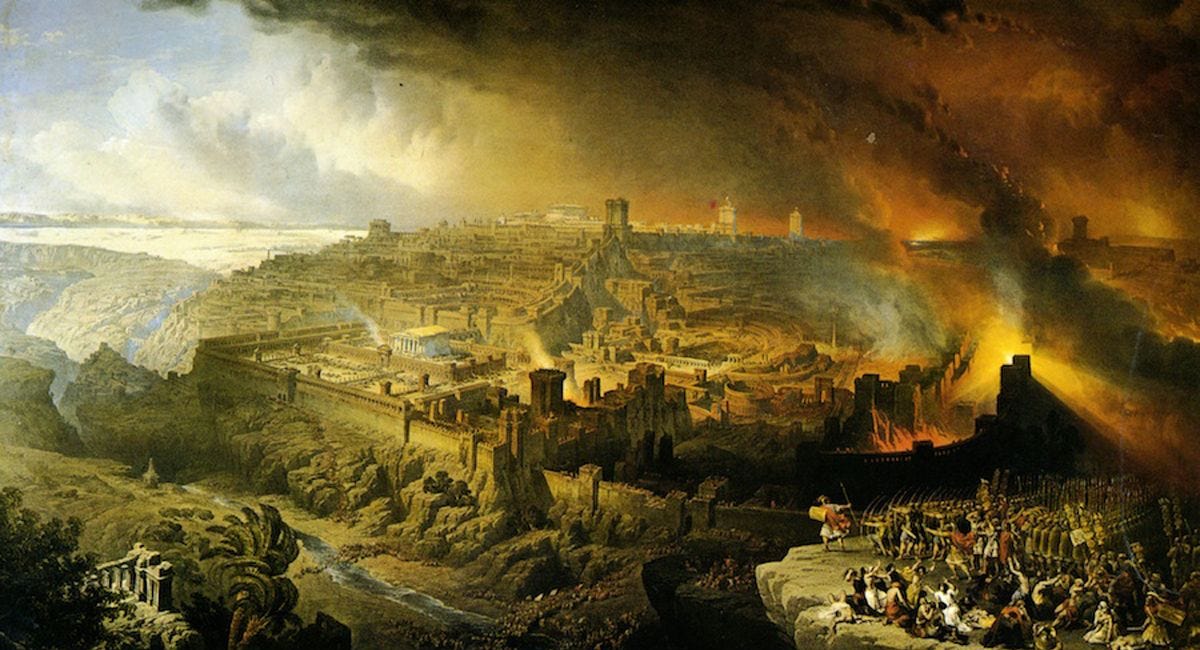Everybody’s heard the tale of the crucifiction. The Nazarene crosses the river Jordan, recruits 12 young apostles, heals the sick, whips the moneychangers, and irritates the Jews bigtime, who call for Pontius Pilate (the Roman governor) to nail his long haired feminist ass to a cross. However, the oldest Christian texts (Paul, Mark, and Matthew) do not actually attest to the Roman empire. Only with the publication of Marcion’s bible circa 140 CE is there a specific reference to Tiberius Caesar. Luke, Acts, and John would later make the Roman empire a focus of the gospel.
Here’s a very strange fact. While Paul mentions Rome in his letter to the Romans (as well as the pseudo epigraphic letter of 2 Timothy), no mention of Rome or Romans is made in the gospels of Mark, Matthew, or Marcion, despite these being the oldest narratives of Jesus’ ministry, and despite their references to Caesar. Meanwhile, Paul never mentions Caesar, and to him Rome is just another city of the gentiles. Nobody mentions “Julius”, and “Augustus” is only mentioned by Luke.1
Caesar first appears in Mark and Matthew as the title of an Emperor - the man who puts his face on coins and then demands them back in tribute. In the original Greek text of the gospels, Caesar is written as Kaisar. I think this word derives not from some dude named Julius but from the Akkadian title of the Emperor, “Sar Kiss” meaning King of Kish and signifying the King of Everything, which had earlier derived from the Sumerian “Lugal Kisara” (King of Kish). Thus Kaisar could actually be “Kish-Sar” and synonymous with the throne of Babylon.2
Besides Kaisar, the only Roman connection in the gospel of Mark is the word Pilate. Not even Pontius is mentioned, a name that later appears in Luke, Acts, and 1 Timothy. See how the evolution of “Pilate” demonstrates the order in which the books were written. In the original letters of Paul, there is no Pilate. In Mark and John, there is only Pilate. In Matthew, there is “Pilate the governor”. In Luke, there is “Pontius Pilate the governor”. “Pontius” also appears in Acts and 1 Timothy.
The etymology of Pilate is surprisingly transparent. In Latin, “pile” is a sharp stick or stake, and “Pilate” signifies someone armed with a javelin. In other words, Pilate in Mark simply means impaler. This fits perfectly with Jesus Christ’s reputation for being executed on a stake - literally impaled and not crucified. The idea of a “cross” is a late Latin confusion; the original Greek gospels say to take up your stake or pole (not your cross) to follow Jesus. As for the name “Pontius”, it could be related to Pontus, the birthplace of Marcion. “Pontius” first appears in Josephus’ Antiquities circa 93 CE, but it could be an anachronism like the Flavian Testimony that accompanies it.
Thus the literary record of Christianity does not attest to a Roman empire until the time of Luke, Acts, and John, which were published around 170 CE - two centuries after the empire was supposedly founded. The earliest gospels of Mark and Matthew do not mention Julius, Augustus, Rome, Romans, or “Pontius”. No part of the Bible mentions a cross. Marcion was the first to place Christianity in the context of the Roman empire by referencing Tiberius Caesar (also present at Luke 3:1). As the Pharisees eventually lament about Jesus, “If we leave him alone, all men will believe in him, and the Romans will come to take both our place and our nation” (John 11:48).
This essay furthers my thesis that the Flavian dynasty were the true founders of the Roman empire and originators of the imperial cult. The Julio Claudian dynasty is entirely fictional. Julius Caesar, born 100 years before Jesus Christ, supposedly founded the Roman Empire 100 years before the Flavians won their civil war and destroyed Jerusalem. Yet Christian texts do not show an explicit awareness of the Roman empire until 200 years later. This despite the fact that Mark shows Jesus predicting the Flavian siege of Jerusalem that occurred in 70 CE.
Some people think Mark was originally written in Latin, which would explain the word “Pilate”. Could Mark possibly be the oldest of all Roman literature?
Read more:
Jesus Christ and "Gay" Caesar: Brothers from Another Mother
There’s something decidedly false about the dawn of the Roman empire, and the more you look for an unbreakable link to the past, the more everything falls apart. While the historical reality of Julius Caesar is typically taken for granted, the early historians do not name him as such, and in some cases his character is absent altogether. First he is jus…
Christianity 101: How to Baptize the Jews with Fire
Christianity is commonly regarded as anti Semitic because Jesus Christ calls the Jews of his day evil and promises the total destruction of their city and way of life. But Christianity cannot be more anti Semitic than Judaism itself, which coined the notion of Jews being punished
Here’s another argument in favor of Luke being based upon Marcion, and not the other way around. Like Mark and Matthew, Marcion does not mention Rome or Romans. But the book of Luke, like its companion Acts, is entirely pre occupied with Romans. Why would Marcion cut the Romans out of Luke? Luke borrows from Mark, Matthew, and Marcion in creating a new version of the gospel.
Just as Caesar is a title and not a surname, so is Christ. Paul often refers to “Christ Jesus”, a syntax better suited to the literal meaning of these words in English: “King Jesus”. As a Christ, Jesus is not unique. He takes the place of the previous Christ, Cyrus, who supposedly built the “second” temple of the Jews. Before Cyrus, David and Saul were named as Christs. In Hebrew, the word for Christ is Messiah. It is the title of YHWH’s chosen king.







>In the original Greek text of the gospels, Caesar is written as Kaisar. I think this word derives not from some dude named Julius
But what an interesting coincidence that that is how his name would be pronounced. Latin pronounciation changed in the Middle Ages, back then "c" was pronounced "k". Also the Byzantine empire used to call the heir to the throne kaisar like 1500 years later. Caesar's name is more likely than an Akkadian term. Why would Greek speakers use Akkadian?
It's true that the Greek word for cross, stavros, meals pole because most crucifictions looked like this: https://en.wikipedia.org/wiki/Crucifixion#/media/File:Justus_Lipsius_Crux_Simplex_1629.jpg still it is not impalement.
Pilatus was a cognomen, which were sometimes hereditary and sometimes nicknames. A soldier skilled with the javelin would be called so. I don't think Mark was thinking in Latin. And there is a big difference between a javelin, an impalement stake and a stavros. The stavros was really thick.
You are retarded